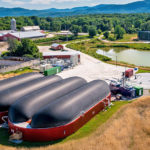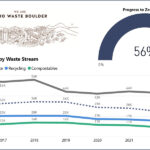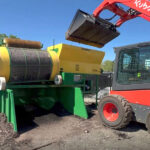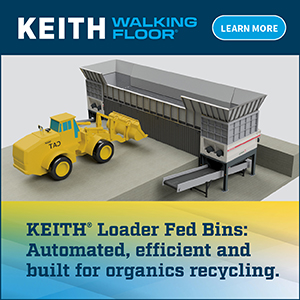Top: College of the Atlantic in Bar Harbor, Maine is at the top of the Top 10 Zero Waste campus list.
The Post-Landfill Action Network (PLAN) posted its first annual list of Top 10 Zero Waste Campuses in 2021, utilizing its Atlas Zero Waste Certification™ standard to make the assessments. “Atlas takes a holistic, campus-wide approach to materials management,” says its website. “We assess campuses based on the existence of campus-wide policies and infrastructure that serve the entire campus. We believe that infrastructure change must precede behavioral change, and that the only way to effectively accomplish infrastructure change is to establish universal campus-wide standards that apply to all facilities on campus.”
Diversion metrics, waste production per capita or any other quantitative measure of material output is not used in the assessments, nor is life cycle analyses (LCAs). “We don’t use LCAs to guide our assessment because most are inherently flawed when looking at the ‘sustainability’ of a given product or material,” explains Atlas. “LCAs often look at a limited scope of the materials’ impacts (like the product’s carbon footprint) as opposed to the overall impact of the product, and the potential for contamination and pollution during production, transportation, use, or disposal.”
Atlas’ Zero Waste methodology is based on Material Management Scopes divided into Hard Goods and Soft Goods. Hard goods are surplus and hard-to-recycle materials that the campus has direct control over. Soft goods are food and single-use materials that the campus purchases, but has limited control over which bin the material is placed in. Included on the list of soft goods are food waste and food packaging; disposable, compostable and reusable dishware; and disposable, compostable and reusable to-go ware. The certification process assesses a campus on the existence of materials management systems that are scored under “system” and “program.” System scores include infrastructure, policy and bin standardization. Program scores are divided into two categories:
- Scope One: Surplus property (e.g., chairs, desks, office supplies) and hard-to-recycle materials (e.g., electronic waste and hazardous materials)
- Scope Two: Compost, food and plastics, which include purchasing, dining, food recovery and compost
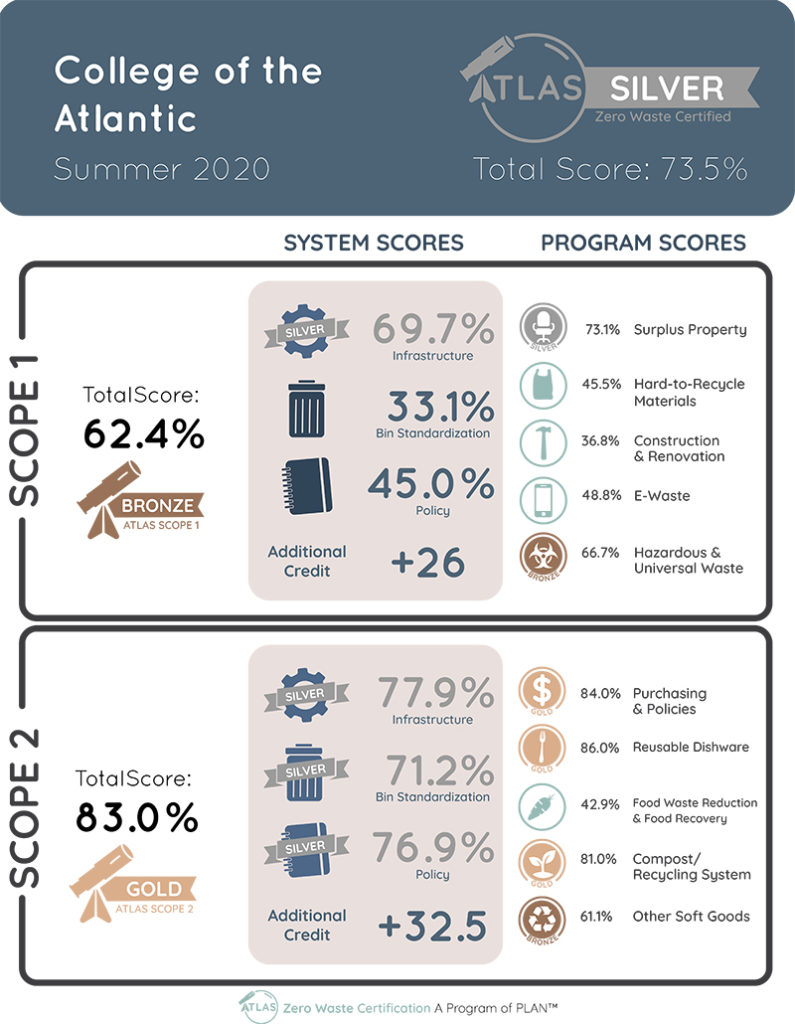 The Total Campus Zero Waste Score is a compilation of both Materials Management Scopes 1 and 2. Four levels can be achieved: Platinum (89.5-100%); Gold (79.5-89.4%); Silver (69.5-79.4%) and Bronze (59.5-69.4%). At the top of the Top 10 list is the College of the Atlantic in Bar Harbor, Maine, which received an overall Bronze score of 62.4% for its Scope 1 score (including 69.7% for infrastructure, and 45.5% for its hard-to-recycle initiatives). Its Scope 2 scores qualified the College of the Atlantic for a Gold rating (83.0%). As shown in the graphic, program scores were 84.0% for purchasing and policies, 86.0% for reusable dishware, 42.9% for food waste reduction and recovery, 81.0% for compost/recycling system, and 61.1% for other soft goods.
The Total Campus Zero Waste Score is a compilation of both Materials Management Scopes 1 and 2. Four levels can be achieved: Platinum (89.5-100%); Gold (79.5-89.4%); Silver (69.5-79.4%) and Bronze (59.5-69.4%). At the top of the Top 10 list is the College of the Atlantic in Bar Harbor, Maine, which received an overall Bronze score of 62.4% for its Scope 1 score (including 69.7% for infrastructure, and 45.5% for its hard-to-recycle initiatives). Its Scope 2 scores qualified the College of the Atlantic for a Gold rating (83.0%). As shown in the graphic, program scores were 84.0% for purchasing and policies, 86.0% for reusable dishware, 42.9% for food waste reduction and recovery, 81.0% for compost/recycling system, and 61.1% for other soft goods.
The second highest scoring campus is the University of California (UC), Berkeley, which achieved an overall Bronze score of 68.3%. UC Berkeley scored 70.7% for its food waste reduction and food recovery initiatives, and 82.1% for its compost/recycling system.Other college campuses in the Top 10 are Carleton and Haverford Colleges, and the Universities of Connecticut, Massachusetts (Lowell campus), Louisville, Vermont, Washington, and St. Thomas.



